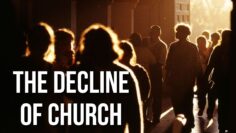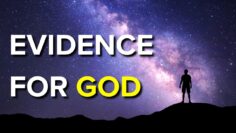
Why We Shouldn’t Expect the Gospels to Agree
For more information, read Cold-Case Christianity: A Homicide Detective Investigates the Claims of the Gospels (http://amzn.to/2AW8bc5)
READ: Why We Should Expect Witnesses to Disagree https://coldcasechristianity.com/writings/why-we-should-expect-witnesses-to-disagree/
J. Warner Wallace, author of Cold-Case Christianity, provides a detective’s perspective related to the New Testament and the Christian Life as he talks with Rob Melnichuk of “It’s Your Call”
source
Click to rate this post!
[Total: 0 Average: 0]











thank God for the so-called contradictions. only now in the 21st century, with enough pieces of evidence from archeology and computational power are we able prove the biblical contradictions to prove that the gospel narrative are literal description of events:
only after the discovery and decipherment of the dead sea scrolls did we determine that 2 calendars operated during the second temple period: the essene calendar and jewish calendar. from this and the different narrations of mark and john are we able to determine that mark was an essene scribe narrating according to the essene calendar, while john narrates according to the jewish calendar. john the baptist was an essene expelled from the community, mark was the young man in linen who fled naked during the arrest of jesus. the archeology even provides us the place where the mock trial occurred, where peter stood, and what the hall looked like.
the 10th of nisan was the same day the high priest went to bethlehem to get the passover lamb and carried it on his shoulder by procession into jerusalem. this was exactly the same day Jesus and his followers entered jerusalem, intentionally entering jerusalem ahead of the high priest. Jesus would have approached the summit of the mount of olives as psalm 114 was being sung. at the summit 115 would have been shouted passing the altar of the red heifer. we can reconstruct that Jesus and his followers would have pre-empted the procession of the high priest as Jesus would have entered and crossing the bridge over the kidron as psalm 116 is being sung. by the time he reaches the threshold of the Eastern Gate, psalm 117 is being sung and as he entered the portico of solomon, psalm 118 was being sung by everyone as the crush of people are greeting him and and wondering who he is.
jesus celebrated the passover meal according to the calendar of the essenes that tuesday night. the last supper was the feast of unleavened bread according to the essene calendar. he was also staying in the upper room in the essene quarter. his arrest, mock trial at the house of annas, and his trial before the sanhedrin was on 12 nisan.
he was passed to pilate for interrogation on 13 nisan and had been interrogated and robed before herod the tetrarch that afternoon in the same 2 palace complex of herod the great where pilate was residing on the opposite palace.
Jesus was presented to the crowd, scourged, an sentenced to death on the morning of 14 nisan. he was crucified at 9am and died 3 pm 14 nisan, 33 AD at the quarry outside the walls of jerusalem, present-day church of the holy sepulcher, 8-15 minute walk from the praetorium/palace complex of herod.
everything is consistent and logistically practical and sound. all thanks to different accounts of the gospels. you cannot construct this amount of detail if this was a lie or fabricated narrative or a distant memory 40 to 70 years away from the date of the events. because the whole new testament was finished before the fall of Jerusalem. we can deduce that revelation was written after the fire of rome, and probably after the death of peter and paul in 67, and definitely several months before the death of nero on june 9, 68 AD
Honestly, the hypocrisy of these arguments becomes clear pretty quickly in reality. I was on a comment thread on another video and in the exact same comment, a skeptic blasted Matthew for “contradicting” Mark, and at the same time accused Matthew of copying 80% of Mark verbatim. Basically, this is a damned-if-you-do-damned-if-you-don’t attempt at a “gotcha.” If the authors borrowed from each other and the accounts are TOO similar, they cry “Collusion! They must have made the stories up!” When they are NOT similar in certain details, they cry “Contradictions! They must have made the stories up because they can’t even agree on all the details!” See the pattern?
Recently stumbled across your work and bought your first book, cold case, and your most recent one, person of interest, and they are incredible. Such amazing work and I am so grateful for your contributions. I would love to see you on Joe Rogan or some other secular podcasts so you can share your perspective. God bless you and your family 😃
The Gospels written by different apostles / followers of the way at different times recount the same events, complimenting the accounts made from their own viewpoint as witnesses. The fact is that the gospels do not contradict each other but incredibly corroborate and compliment each other.
מדהים❤
All these videos are gold. Thank God for these videos.